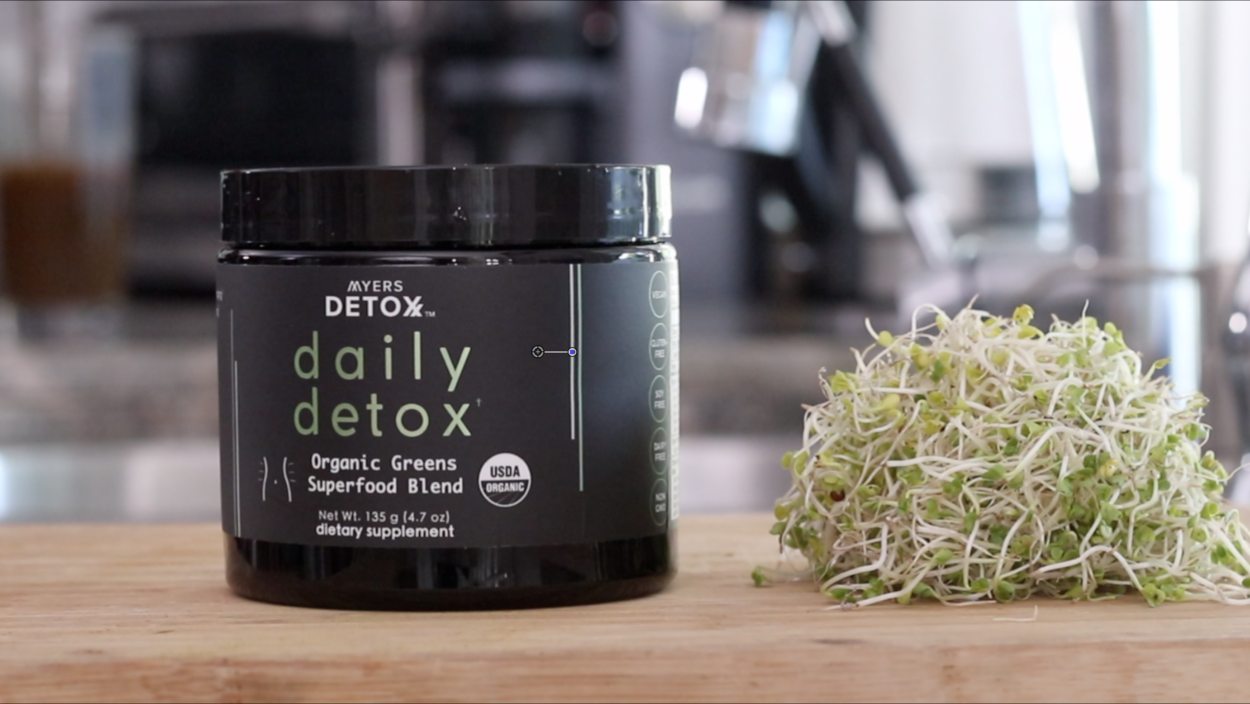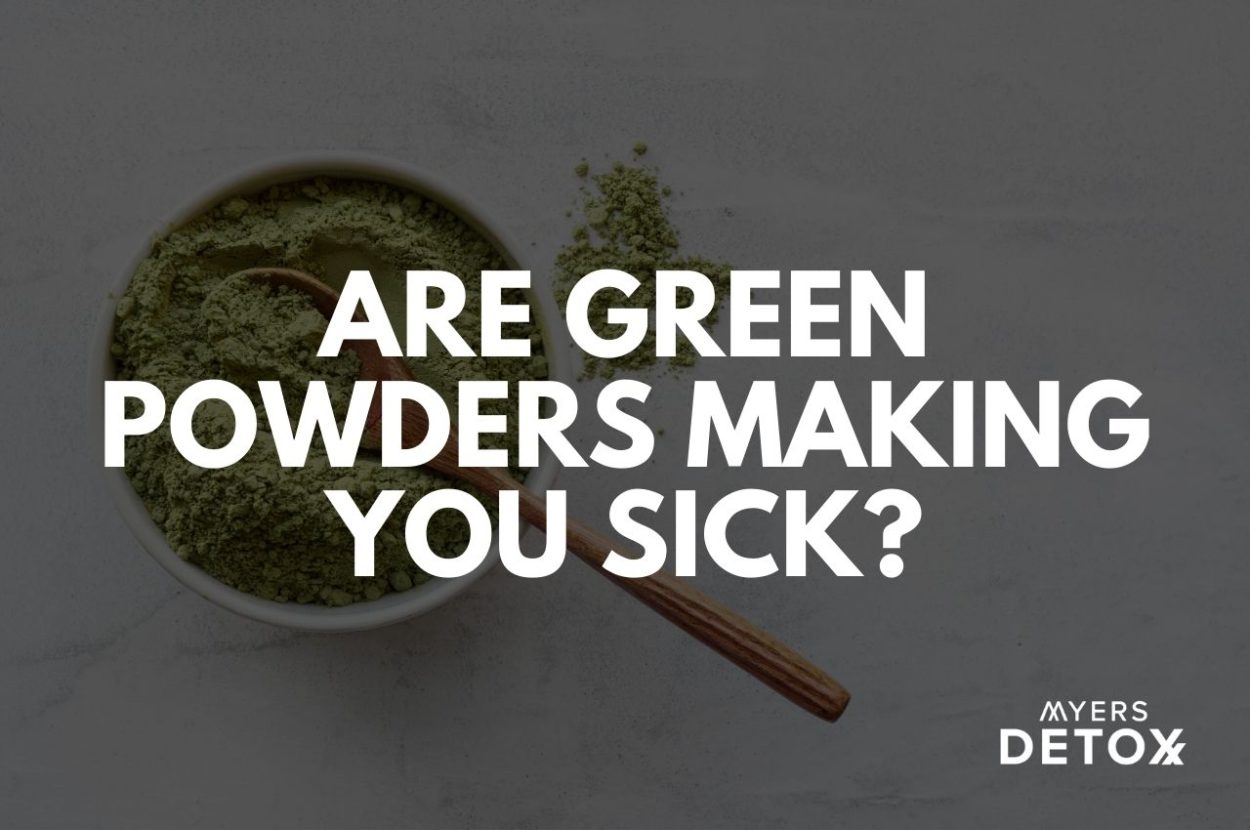Green powders seem like a pretty simple solution when you’re considering how to get enough veggies into your diet. Packed with ingredients like alfalfa sprouts, barley grass, wheatgrass, and even seaweed, these powders appear to be the magical all-in-one answer to your nutrient needs.
But could some of the green powders you find on the shelves of your local stores be a waste of money? Spoiler alert — the answer is yes.
Not all green powders are created equal, and before you shell out your cash, there are a few things to keep in mind.
What You’ll Learn In This Article
- Potential issues with greens powders
- What to avoid when looking for a powder
- What to look for when choosing a high-quality powder
- A simple solution to your green powder needs
Are Green Powders a Waste Of Money?
If you want a healthy body, getting your greens in is a must. Green vegetables are packed with vitamins, minerals, phytochemicals, and antioxidants that can nourish you on a cellular level.
However, the hype around green powders may not be all it’s cracked up to be. While there’s no debate that green plants can enhance your health, the quality of the ingredients and practices of the manufacturer plays an integral role in whether or not that green powder on your shelf is actually going to benefit you.
Let’s take a deeper look at some of the potential issues with green powders.
Antinutrients
Antinutrients are compounds in foods that can inhibit the digestion and absorption of other health-promoting nutrients like vitamins and minerals. There are several known antinutrients, but the one you want to be aware of in greens are oxalates.
Oxalates are particularly high in foods like spinach and rhubarb, but can be found in a variety of green vegetables.
Once ingested, oxalates can bind to calcium, leaving this essential mineral useless to your body.
Diets high in oxalates can even result in kidney stones as calcium binds with oxalates not only in your intestines, but also in your kidneys[1].
Since calcium is required to remove oxalates from your body, and your primary storage form of calcium is in your bones, high oxalate diets can become a significant drain on skeletal health and may lead to decreased bone mineral density[2].
While this can be devastating enough of its own, even more troubling is the impact that unbound oxalates can have on your body.
When free oxalates find their way into your circulation, they can travel to your tissues and enter your cells. From here, oxalates have a detrimental effect on the powerhouse of your cells — also known as your mitochondria.
Your mitochondria are essential cell parts that produce the energy that fuels every organ and tissue in your body. Digestion, physical movement, your heartbeat, even your breathing all rely on the proper function of your mitochondria to keep things running smoothly.
Research shows that oxalates can instigate oxidative stress that damages your mitochondria. The result? Inhibition of crucial energy pathways[11].
What’s more, due to the strain that oxalates put on your body, antioxidant stores are often depleted when oxalates are high. This leaves your body vulnerable to further oxidative damage, often resulting in inflammation and tissue injury[12][13].
When you take a green powder supplement, you may be inundating your body with oxalates. This is especially true when you buy green powders that are on the cheaper end. Spinach is a very inexpensive ingredient, so many manufacturers opt for spinach as a base ingredient in their greens powders. Although spinach may impart some nutritional value — it’s loaded with oxalates.
Heavy Metals
One unexpected ingredient that may be hiding in your green powders is heavy metals. This is particularly disturbing since detoxification is one of the benefits that green powders are supposed to impart.
And yet, Consumer Lab reports have found high levels of lead, arsenic, and cadmium in a wide range of well-known green powders[3].
Heavy metals are associated with a range of adverse health effects, including[4]:
- Digestive disturbance
- Nervous system irregularities (numbness, tingling)
- Kidney damage
- Liver damage
- Memory loss
- Miscarriage
- Anemia
- And more
Understanding the quality of the ingredients in your powders is crucial if you want to avoid heavy metal toxicity.
Non-Organic Ingredients
If you always choose organic produce when filling your shopping cart at the grocery store, your greens powder should be no exception.
However, all too often, consumers choose price over quality when it comes to supplements.
Conventional vegetables are sprayed with pesticides and herbicides that are toxic to your body.
Health implications of consuming these toxins include[5]:
- Disruption to the endocrine system
- Insulin resistance
- Abnormal cellular metabolism of nutrients (fat, protein, and carbs)
- Mitochondrial dysfunction
- Cellular oxidative stress
- And more
While greens are inherently packed with health-promoting compounds, these compounds do not negate the ill effects of pesticides and other non-organic practices.
GMO Ingredients
Similar to non-organic ingredients, GMO (genetically modified organism) ingredients shouldn’t get a pass in your green powder. And you can be sure that unless your supplement clearly states “Non-GMO,” there are GMOs in there.
Why is this? Just like non-organic ingredients, GMO ingredients are cheaper.
The debate as to whether GMOs are safe is always a hot topic. While you can hear both sides of the GMO story, the primary issue with GMOs at this point is that there is still a lot that we don’t know.
One thing is for sure, however, Inserting the genes of one plant into the DNA of another plant hardly sounds like what mother nature intended.
It’s also believed that consuming genetically modified foods may cause the development of diseases that are immune to antibiotics. Along these lines, since GMO crops are grown to combat pests, they could lead to the development of new health issues[6].
What To Look For In Green Powders
Now that you’re well versed in what to avoid when looking for a greens powder, let’s take a look at what your powder should include.
Fermented Ingredients
In the past ten years or so, fermentation has been getting a lot of attention. From do-it-yourself kimchi and kombucha to store-bought fermented veggies, it seems that no matter what health program you’re following, there’s a place for fermentation.
Unlike many health trends out there, fermentation of foods has been around for thousands of years and has some pretty incredible health benefits to back the claims.
When looking for a greens powder, one of the fastest ways to determine if the ingredients are high-quality is to check if there are fermented greens included. While one of the most well-known benefits of fermented foods is the presence of beneficial bacteria (probiotics), in the case of green powders, the main benefit comes from enhanced nutrient absorption[7][8].
As mentioned above, many green vegetables contain antinutrients that leech your body of essential vitamins and minerals. However, when you ferment these foods, it breaks down those antinutrients, allowing enhanced availability of the crucial compounds that your body needs[9].
When you see fermented ingredients on the label, you can be sure that your body is going to be able to utilize the nutrients in the food optimally — a very straight forward case of getting the most bang for your buck.
Organic Label
Always look for the USDA Organic label on your green powders. Unless your greens are grown organically, you can be sure that they have been sprayed with pesticides.
As covered earlier in this article, Ingesting pesticides can result in a litany of health issues.
Possibly even more disturbing, however, is the abundance of heavy metals that can be found in pesticide formulations. Some of the heavy metals that can be found lurking in pesticides include arsenic, chromium, cobalt, lead, and nickel[10].
If the goal of taking a greens powder is to enhance your health, organic labeling is a crucial component. Otherwise, you’re basically mainlining toxic heavy metals into your body.
Non-GMO Label
While you most likely know that avoiding GMOs is a good call, you may not be aware that unless something is labeled “non-GMO”, it probably contains GMOs.
That’s right, food and supplement companies don’t have to alert you that they’re formulating with genetically modified ingredients.
Therefore, it’s crucial that your greens powder contains a “non-GMO” label if you want to avoid the potential downfalls of genetic modification. Luckily, most companies that have organic certification also have non-GMO ingredients.
Research-Backed Ingredients
Here’s the deal, if you’re going to spend extra money getting your greens in, don’t you want those greens to be real superfoods? You would be shocked at the number of green powders out there that are made up of mostly spinach, broccoli, and other easy to come by ingredients.
While spinach and broccoli have their place in a healthy diet, you can easily grab these greens at your local grocery store.
If you’re going to spend money on a green powder, make it worth your dollars. Ingredients like broccoli sprouts, kelp, barley grass, and alfalfa sprouts should make up a good portion of any green power that’s worth its salt.
In addition, other health-boosting ingredients that support your antioxidant systems and liver can provide excellent added value — not all health heroes come in green.
Takeaway: Choose High-Quality Green Powders
So are green powders a waste of money? More often than not, yes.
Typical green powders are made up of low-quality ingredients that may be carrying heavy metals with them.
But that doesn’t mean you should give up on the concept of green powder altogether. In fact, getting in a daily green powder could provide a host of health benefits as long as it’s high-quality.
I struggled in my own search for the perfect green powder, so I decided to take matters into my own hands. Instead of having to sacrifice on any of the key quality markers (organic, non-GMO, fermented ingredients), I identified the best of the best and created Daily Detox.

Daily Detox is non-GMO, organic, free of the top allergens (gluten, dairy, soy), and includes fermented greens. I also threw in some liver support, antioxidant support, and metabolic support because if I’m taking a powder every day, might as well make it comprehensive.
It tastes like a slightly sweet green juice and mixes easily with water. If you’re looking for a green powder that can truly deliver the benefits of greens, check out Daily Detox in my online store.









